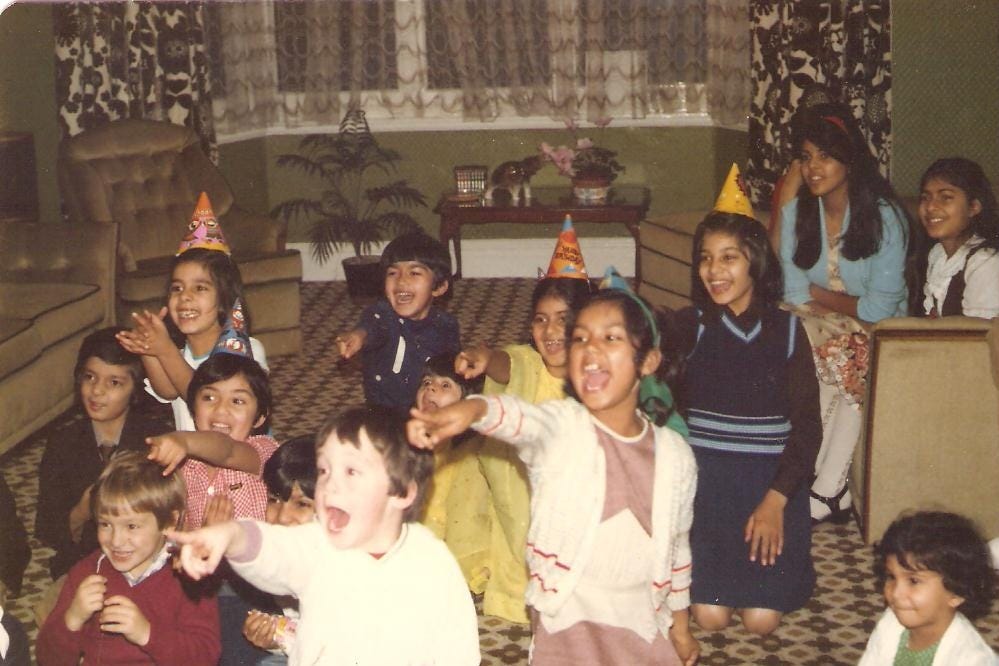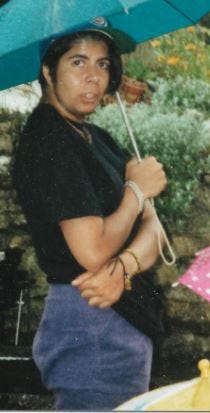My childhood was amazing. I don’t remember being unhappy until I was about seven. Life followed a simple routine: go to school, come home, have dinner, watch TV, go to Jamatkhana (the Ismaili community space) for daily prayers and to meet my friends, home again to bed. At weekends we’d be with Ismaili family and friends or my parents would have people coming home for meetings for Ismaili events that they’d organise. The house was always busy. When I reflect on it now, there were two worlds I was negotiating - my school life and my Ismaili life. They never integrated except once a year at my birthday parties. All this seemed perfectly normal.
This pattern continued as I grew up and when I became a teenager I noticed the divide, the schizophrenic nature of me being one way in school and another way at home. My parents only socialised with my mother’s family. Rarely did we see my Dad’s brother or sister, both of whom were Muslim, but as Sunni Muslims, they didn’t fit into our lifestyle.
I chose to challenge the divide and what better way to do that than to be a punk chick, a brown Muslim punk chick. My routine didn’t change. I’d show up at Jamatkhana in my stripy Mary Quant tights, with half my hair shaved off and I even led the prayers because Ismaili Muslim women can do that, and on a Friday and Saturday night my funky looking friends would meet me outside and we’d go to out together. I didn’t drink, smoke or take drugs and my friends respected me for that. They appreciated that my faith was important to me.
The Ismaili Muslim community was challenged by my behaviour. Here’s a girl, with half her head shaved, wearing cut off combat trousers and Mary Quant stripy tights, leading prayers. Rumours started to circulate about me and my parents found it hard. My Dad stood by me and trusted me, while my Mum didn’t trust me, but she trusted God. Once or twice I took my friends who were not Ismailis to Ismaili events but there was always a sense of them and us.
University was interesting. I tried to keep my connection to the Ismaili Muslim community but a void was growing. By this time, most of the Ismaili Muslim friends I had when I was growing up had fallen away from the faith. That was something that I could easily have done except my relationship with God was still important and there didn’t seem a better vehicle to develop it. Moving to London after university, I decided to try to integrate back into the Ismaili community, to conform. While I developed some amazing friendships, something didn’t fit. BBCD. The community was dominated by an Indian culture that I tried really hard to integrate with, but never quite managed it. Although the ethics of the faith were being preached, the community didn’t seem to understand how to put the teaching into practice. It wasn’t obvious. It was little things, gossip, the unwritten expectations, hierarchy and worst of all, ego. That is still a challenge for me.
The Ismaili Muslim community in the UK is small, about 10,000 people, and most of them knew one of my parents and knew of me. There was always a patient acceptance of who I was and sometimes an openness to listening. When I moved to Canada that all fell away and I experienced the community in all its rawness. The moment I tried to express myself, to be a little different, I was beaten down in a way that was incredibly damaging with no recourse. All the while I supported the younger generation to be themselves while holding on to their relationship with God, yet what was being demonstrated was that you can’t be different and be part of the community and you certainly can’t be a leader in it. The most you can expect is to be left at the edge.
This is not the truth about the Ismaili Muslim community. This is just my personal experience. Many people ask why I became Christian expecting me to say it was one moment. For me, it was a journey. I know that my experience as an Ismaili is NOT what the Ismaili faith teaches and I also know that I am not perfect, but all too often, as an Ismaili, I felt trapped, misunderstood and restricted.
To be clear, I’m not rejecting my Ismaili upbringing, it has been the foundation of most of my life and brought me a long way in my relationship to God. I have now found a community that isn’t perfect, but is committed to growing in relationship with God and with each other. A community that wants to be a demonstration of the Grace of God.









Share this post